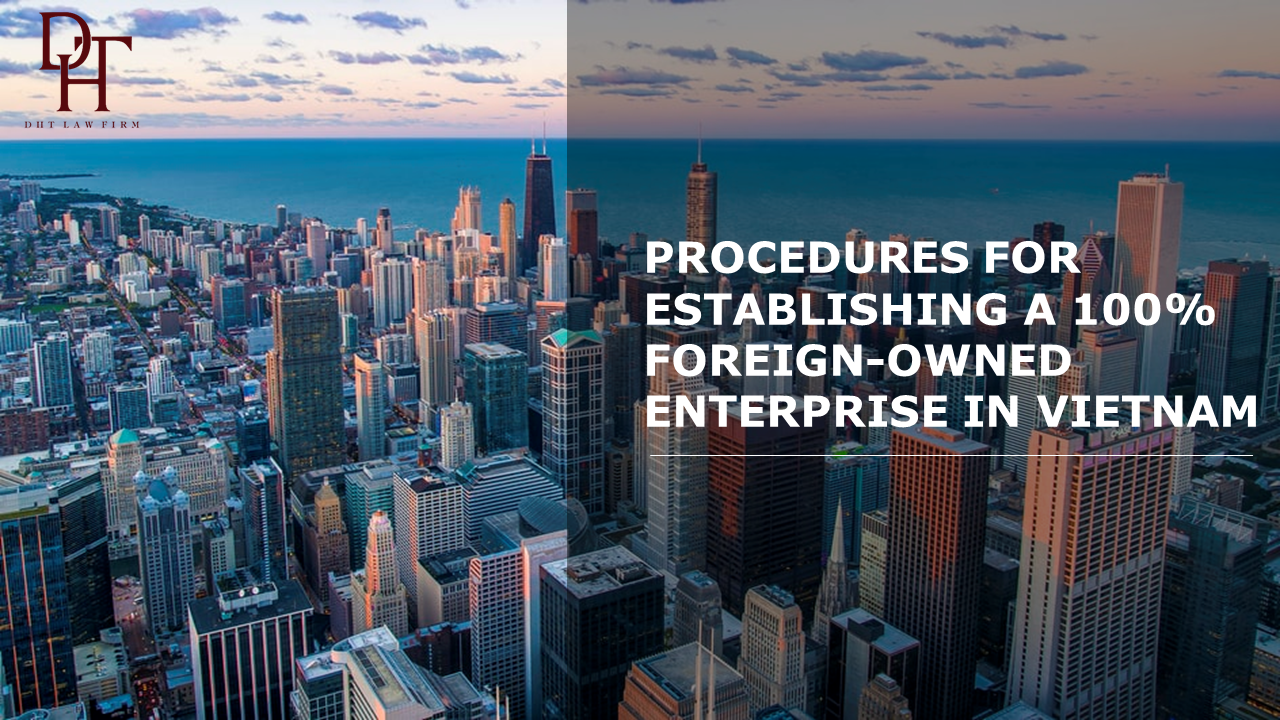
PROCEDURES FOR ESTABLISHING A 100% FOREIGN-OWNED ENTERPRISE IN VIETNAM
I. Definition of the 100% foreign-owned enterprise
Article 3.22, Law on Investment 2020 defined: “Foreign-invested business organization” means an organization whose members or shareholders are foreign investors.” Hence, it is stated that a 100% foreign-owned enterprise is an entity belonging as well as being founded by foreign investors, who have the responsibility to manage the business operation. According to current Vietnamese law, those enterprises have legal entities, founded and operating since the IRC issued date.
A 100% foreign-owned enterprise has the capacity to establish under several types according to Law on Enterprise 2020, including:
- Joint-stock company;
- Limited liability company;
- Partnership;
- Private enterprise.
II. Conditions in order to establish a 100% foreign-owned enterprise
Foreign investors have obligations to fulfill the following conditions for the sake of establishing a 100% foreign-owned enterprise:
- Having a feasible investment plan accepted by competent authorities in Vietnam;
- Having financial capacity to perform investment plans in Vietnam;
- Having obligation commitments in terms of tax, local employment, land use with the Vietnamese Government;
- Having valid dossiers regarding establishing a 100% foreign-owned enterprise under Vietnamese law.
III. Procedures for establishing a 100% foreign-owned enterprise
Stage 1. Register investment guidelines with competent authorities[1]
[1] Article 30, 31, 32 Law on Investment 2020;
Foreign investors register investment guidelines with Congress in cases:
- Investment projects that exert great effects or potentially serious effects on the environment;
- Investment projects that require repurposing of land meant for wet rice cultivation with 02 or more crops of at least 500 hectares;
- Investment projects that require relocation of 20,000 people or more in mountainous areas or 50,000 people or more in other areas;
- Investment projects that require application of a special mechanism or policy that needs to be decided by the National Assembly.
The Prime Minister shall grant approval for investment guidelines of the following investment projects:
- Investment projects that require relocation of 10,000 people or more in mountainous areas or 20,000 people or more in other areas;
- Investment projects on construction of: airports and aerodromes; runways of airports and aerodromes; international passenger terminals; cargo terminals of airports and aerodromes with a capacity of at least 1 million tonnes per year;
- New investment projects on passenger air transport business;
- Investment projects on construction of ports and wharves of special seaports; ports and wharves in which investment is at least VND 2,300 billion within the category of Class I seaports;
- Investment projects on petroleum processing;
- Investment projects which involve betting and casino services, excluding business in prize-winning electronic games for foreigners;
- Investment projects on construction of residential housing (for sale, lease or lease purchase) and urban areas that use at least 50 hectares of land or less than 50 hectares of land but with a population of at least 15,000 people in an urban area; or that use at least 100 hectares of land or less than 100 hectares of land but with a population of at least 10,000 people in a non-urban area; or investment projects regardless of the area of land used or population within the safety perimeter of relics recognized by the competent authority as the national and special national relics;
- Investment projects on construction and operation of infrastructure in industrial zones and export processing zones.
- Foreign investors’ investment projects in the following fields: provision of telecommunications services with network infrastructure; afforestation; publication, press;
- Investment projects which at the same time fall within the power of at least two provincial People's Committees to grant approval for investment guidelines;
- Other investment projects are subject to approval for their investment guidelines or subject to an investment decision by the Prime Minister as prescribed by law.
The provincial People’s Committees shall grant approval for investment guidelines of the following investment projects:
- Investment projects that request the State to allocate or lease out land without auction or bidding for or receipt of land use rights, and investment projects that request permission to repurpose land, except for cases of allocation, lease or permission for repurposing of land of households or individuals not subject to the written approval by the provincial People's Committee in accordance with regulations of law on land;
- Projects on the construction of residential housing (for sale, lease or lease-purchase) and urban areas that use at least 50 hectares of land or less than 50 hectares of land but with a population of at least 15,000 people in an urban area; or that use at least 100 hectares of land or less than 100 hectares of land but with a population of at least 10,000 people in a non-urban area; or investment projects regardless of the area of land used or population within a restricted development area or within a historic inner area (determined in accordance with urban area planning projects) of a special urban area;
- Projects on investment in golf course construction and business;
- Investment projects of foreign investors and foreign-invested business organizations executed on islands or in border or coastal communes; in other areas affecting national defense and security.
Stage 2. Procedures for issuance of the investment registration certificate (“IRC”)[2]
[2] Article 38 Law on Investment 2020;
Within 05 working days from the receipt of the written approval for investment guidelines and the written approval for the investor with respect to the investment project that is subject to the issuance of an investment registration certificate;
For an investment project not subject to approval for its investment guidelines, investors have obligations to perform procedures for an IRC as follows:[3]
[3] Article 36, 39 Decree No. 31/2021/ND-CP;
- The investor shall submit 01 set of application for issuance of the investment registration to the investment registration authority. If the investment project is executed in 02 provinces or more, the investor shall submit the application to the Department of Planning and Investment of a province or central-affiliated city where the investment project is executed or where the operating office is located or expected to be located for the execution of the investment project to apply for the issuance of the investment registration certificate to the project.
- The investment registration authority shall issue the investment registration certificate to the investor within 15 days from the receipt of the valid application.
Stage 3. Establishing enterprises
Having registered IRC successfully, foreign-owned enterprises perform procedures for registering an Enterprise registration certificate (“ERC”), including similar phases compared to Vietnamese-owned enterprises.
Dossiers for ERC procedures include:
- The enterprise registration application form
- The company's charter
- The list of members for a limited company; the list of founding shareholders for a joint-stock company;
- The list of authorized representatives in case members are organizations;
- The copies of Identification, passport or other legal identifications of members who are individuals
- The copies of The founding decision, ERC, or other legal documents, and Power of Attorney (“POA”); Identification, passport, or other legal identification of authorized representatives who are organizations.
- Regarding foreign members who are organizations, the copies of ERC or other legal documents needed to consular legalize.
- The decision on capital contribution and appointment of a manager; The list of authorized representatives (for organization members);
- IRC
The authority is entitled to issue ERC: Department of Investment and Planning located at the enterprise’s head office
Stage 4: Publishing enterprise registration information
Having been issued ERC, the enterprise has an obligation to publish on the National business registration portal, while also fulfilling Government fees according to current laws. The published information includes the content of ERC as well as the following information:
- Business lines
- The list of shareholders; the list of foreign shareholders of a joint-stock company (if any)
Government fees regarding publishing enterprise registration information:
- The obligations to fulfill enterprise registration and announcement fees shall be performed at the date of submitting dossiers. In case of failing to be issued ERC, the enterprise shall be refunded the aforementioned fees.
- According to Circular No. 47/2019/TT-BCT, the announcement fees shall be 100.000 VND.
Stage 5. The procedures for post-licensing
Having been established, investors have obligations to perform the following stages, which are similar to Vietnamese enterprise:
- Hanging a plate at head office
- Registering and buying an electronic signature for the sake of fulfilling tax obligations as well as submitting tax reports via the Internet
- Requesting electronic invoice distribution
- Reporting on project performance based on IRC
- Reporting as well as fulfilling tax obligations accurately based on current regulations.
The newsletter hereof is DHT Law Firm’s consultation in terms of the procedures for 100% foreign-owned enterprises registration. In case valued clients have any further questions, please do not hesitate to liaise with us for timely and professional service.
